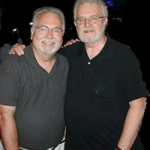Author’s note: As a response to the bile being directed at teachers by President Obama, Oprah Winfrey and NBC News’ Education Nation, I’ve decided to publish a series of articles I wrote celebrating great educators in my life. I encourage others to make the world a better place by sharing stories of great teaching. (use the hashtag = greatteaching)

The challenge of telling one school story is a formidable one. I have so many to share. My colleagues urged me to tell the stories of the felonious teachers who taught from lawn chairs, led ethnic relay races and committed other hideous crimes against children. I could also tell the story of learning to love computing in the 70s because of imaginative trusting educators. Hopefully, I will have such opportunities in the future. This is the tale of music teachers who brought beauty, humor and a sense of place to my life.
Back in the 1970s, the Wayne, NJ Public Schools offered me the opportunity to fall in love with music and pursue it with abandon under the tutelage of spectacular teachers, Bob Simpson, Rocco Patierno, Ted Anderson, George Hicswa and Dick Lukas. Our fluid relationships flowed
from teacher-student, teacher-teacher, friend-friend to fellow artists creating together. My high school supported my desire to take four years of music theory and four years of performance classes (nine in all) without missing a single “important” academic course.
Midway through high school, George Hicswa, a professional jazz musician, achieved his goal of offering a daily Jazz Improvisation course. The class would be concerned with jazz theory, history and performance. Few universities at the time offered such a class. This was the perfect venue for a man of Mr Hicswa’s considerable idiosyncrasies, humor and talent as a musician. This class was quite comparable to the Brazilian Samba School Seymour Papert describes in Mindstorms, as an optimal environment for productive learning.
Please subscribe to my free newsletter
The thing that strikes me today is how the course was so learner-centered. I remember the excitement of calling classmates on Sunday night to plan which records we should bring in to analyze on Monday and Tuesday. At the time we joked that Mr. Hicswa was lazy and that we were teaching his class. I now understand that a great teacher connects his/her wisdom and experience with the interests of students. We always felt that there was great gravity to the work we were doing in this class. After all, we were studying an American art form not taught in American schools. This was a music of the blues – of the struggle for civil rights, being performed reverently by white kids from the suburbs.
The course epitomized an interdisciplinary curriculum making connections between history, musical performance and the mathematics used to learn improvisation. It was a multi-age class you could take for credit year after year. How could that be possible? Because there was always something to learn and new ways to grow. A strong community of practice existed in which we could learn by “playing” together.
I remember the shock on the faces of judges as we took the stage for a jazz competition (one of those obscene oxymorons invented by schools). We would follow paramilitary “stage bands” wearing white platform suits and zoot suits as they faithfully recreated “In the Mood.” The stage band is a musical amalgamation with no analog outside of school.
Our small jazz combo would be garbed in dashikis, kimonos and “bebop helmets.” I once performed on gong. Our repertoire consisted of works by Thelonious Monk, Lee Morgan, Horace Silver, John Coltrane and student composers. We honored ourselves and our musical heroes by sharing our individuality through collective improvisation.
It was never clear if Mr. Hicswa liked teaching or even liked children. What he loved were musicians – even people trying to become musicians. He created an environment in which personal growth was possible. For that I will always be grateful.
©1999 Gary S. Stager
From Curriculum Administrator Magazine — June 1999
Veteran educator Gary Stager, Ph.D. is the author of Twenty Things to Do with a Computer – Forward 50, co-author of Invent To Learn — Making, Tinkering, and Engineering in the Classroom, publisher at Constructing Modern Knowledge Press, and the founder of the Constructing Modern Knowledge summer institute. He led professional development in the world’s first 1:1 laptop schools thirty years ago and designed one of the oldest online graduate school programs. Gary is also the curator of The Seymour Papert archives at DailyPapert.com. Learn more about Gary here.
